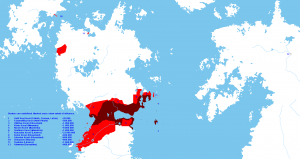Difference between revisions of "Archive:Kosel"
m (MarrisUes moved page Archive:Kosel to Kosel over a redirect without leaving a redirect) |
|
(No difference)
| |
Revision as of 23:23, 29 July 2020
A kosel is a self-proclaimed extraterritorial mandate of the Fals Empire and beforehand, the Ikolinian Kingdom. They differ from colonies in that the Empire does not claim sovereignty over their territory, meaning that the influence of the Empire is restricted to jurisdiction. Kosels are usually self-governed by the Fals community within a country, and in modern times limit their influence, and exclusively the Fals community, to avoid interference with the official government of the country and the non-Fals population. By Imperial law, they come to fall under Imperial jurisdiction upon their creation. Kosels have no defined borders and are thus gauged by the extent of influence the Fals population has within the host country. They may or may not be tolerated or recognised by the host country.
In modern times, kosels have been largely rendered obsolete due to the opportunity of representation in party politics. Nonetheless, they remain as potential extensions for the Fals Empire to exert its influence, although such a case has not occurred since the Fals-Helsonian War. In countries where there is little chance for representation for Fals, there is war, or where Fals are an oppressed minority, Kosels play a greater role, mainly in acting to represent the interest and wellbeing of the local Fals community. Such a case is the Kosel of Falamefflég, which until 2016 played a vital role in negotiation with the Dhweran government in attempts to alleviate the oppressed situation of Fals living on the Phalk islands. When the Joint Republic of Pthalk formed in 2016, the Kosel and its council was redesigned to become the half of the government that represents the the Fals-populated half of the country.
Historically however, kosels have been implemented additionally as tools of power projection and colonisation. The most recent example of this was the Kosel of Taplaslég situated on Taplaslég shortly before the Fals-Helsonian War. Originally under Helsonian control, large-scale illegal immigration of Fals from the mainland of Boroso threatened to throw off the balance of power between the Fals settlers and the Terminians native to the island. When the Helsonian government began establishing measures to inhibit the immigration of Fals and to counter the smuggling of Fals onto the island, the Kosel started warning the government that it would not stand for what it perceived as unfair treatment. At this point, the Fals population counted between 40-50% of the island's total population. During all this time, the Kosel ensured the steady immigration of Fals to the island by providing support and materials to immigrants and smugglers, and threatening with serious repercussions if the Helsonian government mistreated or evicted Fals from the island. The Kosel received instructions directly from the government of the Fals Empire throughout this. The Helsonian government conducted raids on many members of the Kosel council and its important associates from July 20 to the beginning of August 1933 in an extensive mop-up operation after tensions with the Fals Empire heightened. This ended the existence of the Kosel, but many associates were still free. From then until the beginning of the war in 1936 with the Fals Empire's invasion of the island, members of the former Kosel acted to destabilise the Helsonian presence on the island by terrorism and subversion.
Etymology
The word kosel was first documented in writing in 1533, in a text talking about the independece of Korelland from the Ikolinian Kingdom, where it referred to a small piece of land outside of Zükij set aside where Ikolinian merchants, sailors, and tradesmen were allowed to do business and work, after Ikolinians were banned from having professions in the rest of the country. Etymologically, the word is believed to have derived from the earlier kosselw, consisting of the words kos + selw (corresponding to modern kos + seli, compare halsel - "capital"), respectively "clearing" + "circle, ring"; presumably denoting a clearing in a forest with ample sight in every direction.
